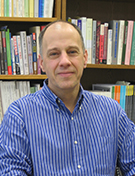Seminar: Jim Raymo - University of Wisconsin
| When |
Apr 22, 2019
from 12:00 PM to 01:00 PM |
|---|---|
| Where | 1101 Morrill Hall |
| Contact Name | Jennifer Doiron |
| Contact Phone | 301-405-6403 |
| Add event to calendar |
|
About the Presentation -
Weakening or reversal of the negative educational gradient in women’s marriage represents a profound shift in patterns of family formation in many high-income countries. This change is thought to reflect as shift in the “economic foundations of marriage” that has occurred in the context of a broader “gender revolution.” My goal in this talk is to provide a broad overview of educational differences in women’s marriage in Japan to shed light on distinctive features of the Japanese context and to provide a lens on social change. To set the context, I begin by summarizing the findings from two earlier papers published in 2003 and 2005. These papers document a strong negative relationship between women’s education and marriage and show that decline in the marriage rates of highly-educated women is partially explained by rapid convergence in men’s and women’s educational attainment combined with the maintenance of strong norms of educational homogamy and female hypergamy. This pattern of results is consistent with expectations of declining benefits of marriage for women with high earnings potential in settings characterized by a highly asymmetric gender division of labor. I will then present results from a new paper that uses methods similar to the earlier papers to examine very recent trends in Japanese marriage. In this paper, we show that the negative educational gradient in women’s first marriage disappeared in the mid-2000s and reversed around 2010. This change was brought about by a combination of declines in the marriage rates of less-educated women and increases in the marriage rates of highly-educated women. The former finding is consistent with expectations derived from the theoretical emphases on deteriorating employment circumstances among the low educated whereas the latter is consistent with expectations from the so-called gender revolution framework.
About the Speaker

Jim Raymo is professor and chair of Sociology at the University of Wisconsin-Madison. He is also the former director of the Center for Demography and Ecology and current training director for the Center for the Demography of Health and Aging. Raymo’s work focuses on two broad areas of inquiry -- the demography of family change in Japan and the demography of work, family, and well-being at older ages.
